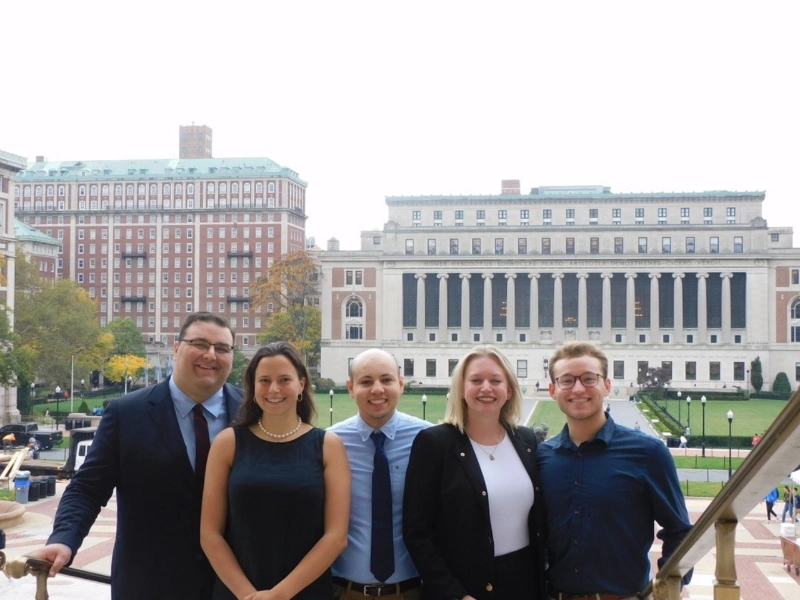The Best Colleges for Chemistry: A Comprehensive Guide through the Top 10 Chem Programs in the U.S.

When it comes to your chemistry education, the best college for you is going to depend on whether you're interested in analyzing chemicals (analytical chemist), understanding the essentials of chemistry or the studying of chemical processes (biochemist).
In a highly demanding field like chemistry, your choice of school will affect your future opportunities like graduate school admissions, research or lab work, career prospects and more. The question is: with so many top chemistry programs, how do you know which college is going to house the education possible?
In my opinion, choosing the right college for a chemistry degree is as important as graduating, if not more! For students pursuing careers in science, medicine, research, or chemical engineering, true knowledge and learning begins in the classroom. And what better way to figure out your ideal path than by weighing your options between top of the line laboratories, world class faculty, and research opportunities that prepares graduates for roles in the chemistry industry.
Today, I will share my tips and strategies on how I chose the graduate program of my dreams. And I can assure you it wouldn't have been possible without knowing what I was looking for.
In this guide, I provide a break down of how you can narrow your options of chemistry colleges by reviewing:
- The 10 top-ranked U.S. universities and colleges for chemistry,
- What career you can land as a chemist,
- And even provide a brief overview of the what the study of chemistry consists of and how it applies to every day life.
So, whether you're interested in organic chemistry, chemical physics, or even having exclusive research opportunities in reach, it's important to know where to start. So, use this guide to explore the best options and start building your future in chemistry.
Are you interested in a career in science and chemistry? Visit our blog to learn more about all things college and start applying for scholarships today!

Top 10 Chemistry Colleges in the U.S.
Chemistry is known to be one of the most essential sciences that impacts industries from healthcare, to energy, and choosing the right university for your chemistry education is crucial.
Below, we explore top 10 chemistry programs in the country:
1. California Institute of Technology (CalTech)
- Location: Pasadena, CA
- Average tuition: $65,622
- Acceptance rate: 3.1%
Coming in at #1, the chemistry program at Caltech is known for being research‑intensive, with around 30 faculty specializing in organic/inorganic synthesis, chemical physics, theoretical chemistry, bioorganic chemistry, and materials chemistry. Undergraduates have opportunities to begin research as early as their first year, and even have access to graduate‑level courses from early on in their educational journey.
2. Massachusetts Institute of Technology (MIT)
- Location: Cambridge, IL
- Average tuition: $64,310
- Acceptance rate: 4.7%
MIT’s Department of Chemistry includes biological, inorganic, organic, and physical chemistry. Students can expect a rigorous and research‑oriented program where they frequently join labs. Graduate students can also pursue world‑class research experience in fundamental chemistry, materials, sustainable energy, and chemical biology.
3. University of California - Berkeley
- Location: Berkeley, CA
- Average tuition: $17,582
- Acceptance rate: 11.7%
The College of Chemistry at Berkeley is one of the largest and most prestigious chemistry schools in the country, offering students Bachelor's of Science and PhD in chemistry and chemical biology degrees. Its undergraduate curriculum includes specialized fields like analytical, nuclear, and biophysical chemistry, with lab facilities and instrumentation. Graduate students engage early in research and can also serve as instructors, as well.
4. Harvard University
- Location: Cambridge, MA
- Average tuition: $59,320
- Acceptance rate: 3.5%
Harvard’s chemistry program is widely regarded for academic excellence in organic and synthetic chemistry and offers dual‑degree pathways in MD and PhD. Their curriculum is well‑rounded and research‑intensive, with strong instrumentation and facilities. Undergraduates enrolled in the chemistry program may cross‑register at MIT, as well.
5. Stanford University
- Location: Stanford, CA
- Average tuition: $22,577 a quarter
- Acceptance rate: 3.9%
Stanford’s Chemistry Department is known for their extensive research across physical, synthetic, energy, environmental, and bio‑related chemistry. The PhD program prepares students for diverse careers in teaching and research. Students at all levels should know the program is demanding, and grade impacts are noted in introductory courses.

6. Northwestern University
- Location: Evanston, IL
- Average tuition: $23,125 a quarter
- Acceptance rate: 7.2%
Northwestern University's chemistry program integrates chemistry fundamentals with hands‑on learning. The department emphasizes interdisciplinary and environmental science, and supports collaborations with environmental policy and indigenous knowledge courses, establishing its commitment to experiential education and cross‑disciplinary engagement.
7. Princeton University
- Location: Princeton, NJ
- Average tuition: $65,210
- Acceptance rate: 4.5%
Princeton’s Chemistry Department offers top-tier research facilities and a culture focused on both fundamental and applied chemistry. The department is especially strong in catalysis and chemical biology. Doctoral graduates often transition directly to pharmaceutical and industry roles. Students praise the closeness to faculty and the quality of its laboratory infrastructure.
8. Scripps Research Institute
- Location: La Jolla, CA
- Average tuition: $34,106
- Acceptance rate: 24.7%
The Chemistry Department at Scripps Research (also known as the Skaggs Graduate School of Chemical and Biological Sciences) is renowned for pioneering “click” chemistry, chemical biology, and drug discovery tools. Graduate doctoral programs combine interdisciplinary coursework with structured labs in chemical synthesis, medicinal chemistry, RNA/DNA biology, and nanomedicine. It ranks in the top 6 nationally for chemistry research.
9. University of Chicago
- Location: Chicago, IL
- Average tuition: $71,325
- Acceptance rate: 5.4%
Chicago’s Chemistry Department, founded in 1891, emphasizes excellence in research and teaching. Faculty work in organic, inorganic, physical, biochemical, and materials chemistry, with collaborative ecosystems in institutes like the James Franck Institute and Ben May Cancer Institute. The graduate program offers flexible, individual research trajectories; undergraduates often engage in faculty research early and benefit from close mentorship.
10. University of Illinois - Urbana-Champaign
- Location: Urbana, IL
- Average tuition: $23,426
- Acceptance rate: 43.7%
UIUC Chemistry is known for interdisciplinary and applied research (e.g. mechanochemistry, sonoluminescence, materials sensing). Groups such as the Suslick lab work on novel areas including nanoscale materials synthesis and artificial olfaction. The department at large is strong in materials, analytical, and physical chemistry, with excellent research opportunities for graduate and undergraduate students
Whether you want to work in a lab, go into medicine, or take on global challenges like climate change, earning a degree from a top chemistry program can set the tone for a successful career.
Careers for Chemistry Majors
As a chemistry student, your degree can open doors to a wide range of jobs across multiple industries. Some of these career paths include:
- Pharmaceutical Chemist: Development of new medications.
- Analytical Chemist: Analyzing, identifying, and studying the properties of substances.
- Chemical Engineer: Applying chemistry, physics and engineering principles to design, develop and optimize processes for producing chemical, fuels and other products.
- Biochemist: Study of the chemical processes in living organisms.
- Materials Scientist: Study the properties of and develop new materials for use.
- Environmental Chemist: Working pollutants and developing strategies for environmental protection
- Forensic Scientist: Applying chemistry in criminal investigations.
- Academic/Research Chemist: Students go on to graduate school or land research positions in a university or lab setting.
For Your Information: the demand for chemists is expected to grow in pharmaceuticals, biotech, and energy sectors within the coming years.

Choosing the Right Chemistry Education
Selecting a school with a strong chemistry department can make or break in your educational experience which is why it's important to be strategic about your decision-making process. When choosing a school for your chemistry education, consider universities with:
- Ranking: It's important to pay attention to schools with high national rankings in science and chemistry. The higher the ranking, the better the program.
- Campus Facilities: Having access to well-equipped and established labs and research facilities is key to academic success.
- Research: Pay attention to colleges that offer opportunities for research.
- Faculty Network: A school with strong faculty credentials is one that aims for academic success.
- Professional Opportunities: Look for programs that offer opportunities for internships, co-op programs, and projects with hands-on experience.
- Student Testimonials: Look into student testimonials and success stories to figure out your chances at career placement.
Above all, the right chemistry program is one that offers a balance between in-classroom instruction and hands-on lab experience. While it's important to be logical and practical about your education, you should also make sure the college program. you choose supports your personal and academic endeavors.
Intro to Chemistry
Chemistry is the study of matter, what it's made of, how it behaves, and how it changes in different environments. As a chemistry student, you will learn everything there is to know about the things that makes up the world. From atoms and molecules to complex chemical reactions, you can expect to learn the fundamentals of the world's make up.
Chemistry also plays a key role in solving real-world problems in industries like medicine, energy, the environment, and technology. Chemistry is also known as the "central science" because it bridges other scientific fields like biology, physics, and engineering together.
As a student, you can expect to start with these introductory chemistry courses:
- Atomic structure
- The periodic table
- Chemical reactions
- Thermodynamics
- Kinetics
- Laboratory safety and techniques
The study of chemistry prepares students for more specialized study of matter, whether in organic, inorganic, physical, or analytical chemistry.

Frequently Asked Questions About The Best Colleges for Chemistry
What is the best chemistry school in the country?
According to the U.S. News and World Report, California Institute of Technology (CalTech) is the top chemistry college in the country with MIT (Massachusetts Institute of Technology) and Stanford University coming in close behind it. Though these institutions are renowned for their cutting-edge research opportunities, faculty, and industry ties, the best school for you ultimately depends on your interests, aspirations and educational goals.
What can I do with my chemistry degree?
Good news for chemistry students, a chem degree can open doors to a list different chemistry industries like research, pharmaceuticals, environmental science, and more. Chemistry based majors are also knowledge and well-trained for medical, dental, and law school. A bachelor's degree is often the first step, but many students choose to continue their education with graduate or professional degrees.
How do I know which program is best for me?
Honestly, there may never be a chem program that is "best" for you as every school has something unique to offer, however, there are ways to know which programs align with you and your goals. In order to know this, consider your career goals, learning style, and interests. You should also consider the school's course offerings like faculty, lab facilities, and even rankings. You should talk to current students to further explore whether the university offers what you're looking for your education.
Stay up-to-date with insights for chemistry majors in our blog and discover hundreds of exclusive scholarships to apply for your educational journey.